2020 Instructors
Note: Our course instructors are subject to change.
Keynote: Craig Primmer

Craig Primmer is a professor of genomics at the University of Helsinki, Finland, and leads the Evolution, Conservation, and Genomics research group. He is interested in understanding the genetic basis of ecologically relevant traits and has focused on salmonid fishes as a study target. Currently, funded research utilizes opportunities provided by the relatively simple genetic architecture of Atlantic salmon age at maturity, combined with the strengths of Atlantic salmon as a model for functional genomics, ecological and evolutionary research. The research aims to link genotype, phenotype, and fitness of this important life-history trait using approaches ranging from investigating the cellular-level processes in the laboratory to estimating reproductive success in completely natural populations. This information is also used for improving the conservation and management of this iconic species. His research is currently funded by the European Research Council, the Academy of Finland as well as other local agencies.
Website: http://www.helsinki.fi/evolution-conservation-and-genomics
Eric C. Anderson

Eric is a research molecular geneticist at the Southwest Fisheries Science Center, Santa Cruz, CA, and a research associate in the Institute of Marine Sciences at University of California, Santa Cruz.
Eric develops and applies statistical and computational methods for inference from population genetic data. Most methods are directly relevant to management and conservation. His work has focused on Monte Carlo methods for efficient calculation of likelihoods from genetic models, Bayesian methods, computations on the coalescent process, application of hidden Markov models and graphical models to genetics, and inference in finite mixture models. He has recently been involved in developing methods for multigenerational pedigree inference using SNPs, deriving and using multiallelic "microhaplotype" marker data from next generation sequencing of amplicons, and large-scale pairwise relationship inference for close-kin mark-recapture.
See Eric's research page for details: https://users.soe.ucsc.edu/~eriq/eric_ams/Research.html
Ellie Armstrong

Ellie is a 5th year PhD Candidate in the Petrov and Hadly labs at Stanford University. She primarily focuses on the genomics of large carnivores and how we can improve genomic resources and build low-impact monitoring techniques for these species. She is experienced in both short and long-read genome assembly methods across diverse taxa and whole-genome resequencing methods. She is particularly interested in the dynamics of small populations and how common population genetic estimates such as heterozygosity reflect population health, adaptive potential, and extinction risk.
Brenna Forester
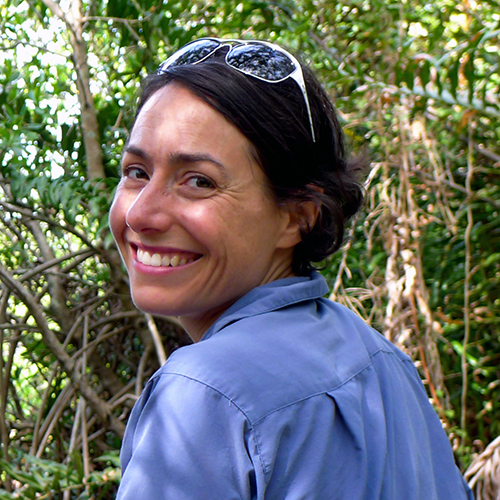
Brenna is a landscape and molecular ecologist focused on conserving biodiversity in a period of rapid global change. Her research integrates environmental, genomic, and phenotypic data sets to assess adaptive capacity and inform the management of threatened species. Her current research areas include integrating genomic data into listing frameworks under the U.S. Endangered Species Act, and conservation genomics of imperiled amphibians. She completed her MSc at Western Washington University and her PhD at Duke University. She is currently a David H. Smith Conservation Research Fellow.
Website: http://brenna-forester.weebly.com
W. Chris Funk
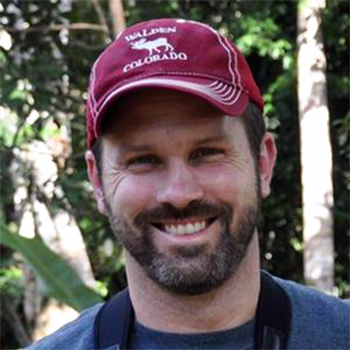
My research is at the interface of evolution, ecology, genomics, and conservation. In the most general sense, I investigate the evolutionary and ecological mechanisms that generate and maintain biodiversity by combining population genomics, experimental manipulations, and field studies. Much of my current research focuses on interactions between gene flow and local adaptation.
In addition to my interest in basic questions in evolutionary ecology, an important part of my research program applies population genetic concepts and new genomic tools to address conservation questions. Population genetics and genomics are invaluable in conservation and management for the delineation of conservation units, determining patterns of genetic connectivity across landscapes, and assessing the status and viability of threatened species. A major focus of my research program is the application of population genetics and genomics to address critical questions for biodiversity conservation.
Brian Hand

Brian Hand is an Assistant Research Professor at the University of Montana and the Flathead Lake Biological Station. Hand has conducted work across multiple genomics fields with a focus on bioinformatics, population, and landscape genetics/genomics. More recently he has been working on measuring the adaptive capacity of multiple stonefly species. As Co-PI on an NSF Dimensions of Biodiversity grant, his work on the project has included genome assembly for multiple stonefly species, whole-genome resequencing, and landscape/population genomics of aquifer dwelling and benthic species. Concurrently, he is Co-PI on a grant on forecasting the potential spread and invasion of Aquatic Invasive Species. This NASA funded project aims to integrate remotely sensed data, spatial distribution modeling, and eDNA sampling to better inform AIS management in the protection of native species.
Website: http://flbs.umt.edu/people/Hand3461
Paul Hohenlohe

Paul A. Hohenlohe is an associate professor at the University of Idaho in the Department of Biological Sciences and the Institute for Bioinformatics and Evolutionary Studies. Research in his group focuses on population genetics and genomics in a wide range of systems with applications to conservation. He has been involved in developing analysis methods and applications for RAD sequencing, and ongoing research also uses techniques such as sequence capture and whole-genome sequencing. Current projects include the genomics of disease resistance in Tasmanian devils and island foxes; admixture and adaptation in pygmy rabbits, red wolves, and tamarisk leaf beetles; and adaptive capacity and local adaptation in scrub jays, redband trout, and sagebrush.
Website: https://hohenlohelab.github.io/
Marty Kardos

Marty Kardos is a research molecular geneticist with the National Marine Fisheries Service at the Northwest Fisheries Science Center in Seattle. He uses empirical and simulation-based approaches to understand evolution and population dynamics in the wild. Kardos' current work focuses on using genomic analyses of marine mammals and marine and anadromous fishes, with the ultimate goal of informing resource management and conservation. He is particularly interested in using genomic approaches to understand inbreeding depression, historical population size, hybridization, and its fitness consequences, and the intersection of adaptive potential and population dynamics.
Joanna Kelley

Joanna Kelley's research interests include understanding how populations diverge and adapt to different environments, using comparative genomics and RNA-sequencing. She also uses statistical and genomic approaches to characterize specific genes and pathways that underlie adaptive change. She works on multiple different species from hydrogen-sulfide adapted fish to polar fish to bears. She received her PhD from the University of Washington, Department of Genome Sciences. She completed postdocs at Stanford University and the University of Chicago before starting her faculty position at Washington State University.
Website: https://labs.wsu.edu/genomes
Gordon Luikart

Gordon Luikart is a professor at the Flathead Lake Biological Station (University of Montana). He was a Research Scientist with the Centre National de la Recherche Scientifique (CNRS) at the University Joseph Fourier in Grenoble, France, and Professor at the University of Porto (and CIBIO) Portugal. His research focuses on the development and application of molecular and computational approaches to understand the genetic basis of fitness, adaptation, connectivity, spread of invasive species/pathogen, and the conservation wild and domestic animals. He coauthored the book entitled Conservation and the Genetics of Populations, with Fred Allendorf and Sally Aitken (http://www.wiley.com/WileyCDA/WileyTitle/productCd-EHEP002672.html).
Mike Miller
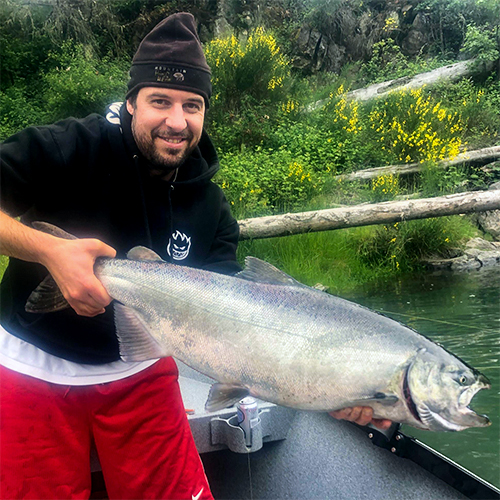
Mike Miller is and assistant professor of population/quantitative genetics/genomics at the University of California, Davis. His research interests are in animal genetics and genomics, conservation and ecological genomics, bioinformatics technology development, and salmonid fishes. He is a co-inventor of RADs and related novel molecular technologies. Mike led the sequencing of the rainbow trout genome.
Steve Mussmann

Steve Mussmann is a research affiliate of the University of Arkansas. His MS (University of Illinois at Urbana-Champaign) and PhD (University of Arkansas) focused on conservation genetics of both terrestrial and aquatic organisms. Research interests include: bioinformatics, software development for population genetic analysis of non-model organisms, delineation of conservation units, phylogenetics, population genetics, and native fishes of the southwestern US. Currently, Steve is working on publishing his dissertation, which includes a comprehensive phylogenetic and population genetic analysis of speckled dace (Rhinichthys osculus) throughout its range in western North America.
Rena Schweizer

Rena Schweizer is a postdoc in the Division of Biological Sciences at the University of Montana. She is an evolutionary biologist who integrates genomics, physiology, and modern computational methods to understand the genetic basis of adaptation in natural populations. During her graduate work at UCLA, Rena implemented genomic approaches to understand genetic substructure and natural selection in gray wolves. She also developed bioinformatics resources and led analyses in several multi-institutional collaborations exploring demographic history and selection in dogs and wolves. Rena has extensive experience in many types of genomic data, and has learned a suite of computational skills, including scripting in Python, R, and Unix and parallelizing analyses on multi-core servers.
Website: http://www.renaschweizer.org
Amanda Stahlke

Amanda Stahlke is a PhD Candidate in the Bioinformatics and Computational Biology Program and Research Assistant in the Hohenlohe Lab at the University of Idaho. She studies evolutionary genomics of managed species with the goal of informing management decisions, from Tasmanian Devils to introduced biocontrol agents and invasive plants. Her research uses simulations, reduced representation sequencing, and whole genomes to understand contemporary, rapid evolution.
Gregg Thomas

Gregg is a postdoctoral researcher in the Division of Biological Sciences at the University of Montana in Jeff Good's lab. He got his PhD in Evolutionary Biology and Bioinformatics at Indiana University. His main research interests center around how changes in DNA sequences play a role in adaptation. He uses genomics and phylogenetics to understand the patterns and drivers of molecular evolution in a comparative framework, and he works through some of the problems in these analyses that come with vast amounts of genomic data. To this end, he has worked on modeling mutation rate variation in mammals, detecting convergent evolution using genomic data, and analyzing gene families in a number of species, including leading the comparative portion of the i5K project. He develops software to analyze biological data, including GRAMPA which aids in the study of polyploidy by using gene tree topologies, and Referee which annotates genome assemblies with quality scores, and he contributed to the latest version of CAFE to account for error in gene family analysis.
Website: https://gwct.github.io
Robin Waples
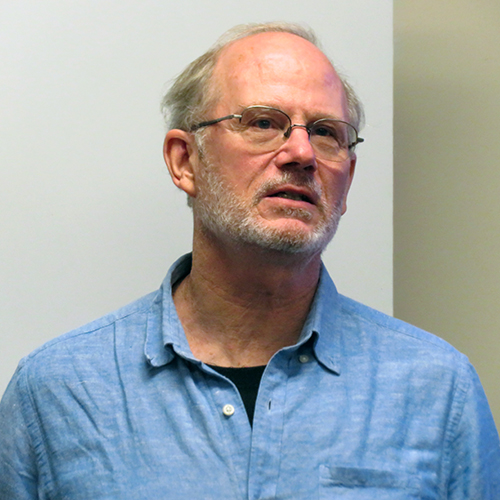
Robin Waples is a senior scientist at the Northwest Fisheries Science Center of the National Marine Fisheries Service in Seattle. Robin led the Conservation Biology Division for a decade, conducting comprehensive reviews of the status of Pacific salmonids under the US federal Endangered Species Act. Research interests include: adapting standard population genetics theory so that it can be applied to real-world problems; combining diverse types of information (molecular genetics; life history; ecology) to characterize hierarchical levels of diversity in Pacific salmon; assessing the viability of complex conservation units that include multiple independent populations and diverse ecotypes; methods for analyzing gene flow and population structure; evolutionary consequences of anthropogenic changes to natural habitats; patterns of reproductive success across space and time; effects of age structure on calculation and estimation of effective population size.
Website: https://www.nwfsc.noaa.gov/contact/display_staffprofile.cfm?staffid=188
Robert Waterhouse

Rob's undergraduate studies were in Cellular and Molecular Biochemistry at the University of Oxford. His masters and doctoral work were in Bioinformatics and Comparative Genomics at Imperial College London with a focus on computational comparative analyses of insect genomes. During his postdocs in Geneva, he worked on orthology delineation (www.orthodb.org) and genome completeness assessment (BUSCO, https://busco.ezlab.org), and as a Marie Curie International Outgoing Fellow at the Massachusetts Institute of Technology, he led the comparative analysis of multiple mosquito genomes. In Switzerland, he directs his research group as a Swiss National Science Foundation Assistant Professor and SIB Swiss Institute of Bioinformatics Group Leader at the Department of Ecology and Evolution, University of Lausanne, with a focus on the comparative evolutionary and functional genomics of disease-vector mosquitoes and other insects.
Website: www.rmwaterhouse.org
Maren Wellenreuther
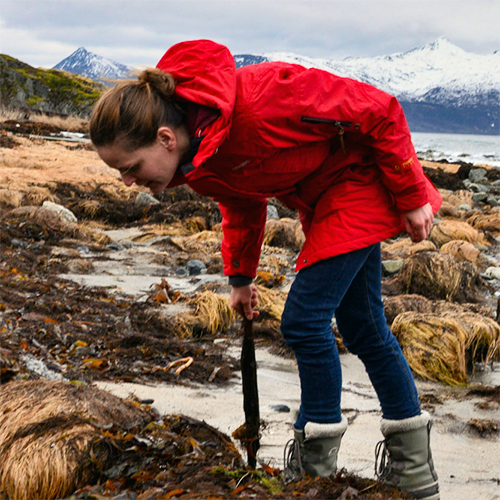
Maren Wellenreuther is an Associate Professor at Auckland University and Science Group Leader for Plant and Food Research New Zealand. Her research is rooted in evolutionary theory and is unified by the goal of understanding how adaptive and non-adaptive evolutionary processes interact in nature. Research areas range from evolutionary ecology to genomics and focus on topics such as sexual selection, adaptation, aquaculture, selective breeding, and population demography. Whenever possible, she employs complementary approaches at the genomic, phenotypic, ecological, and environmental levels. Her research has societal relevance to the diversity crisis, nature conservation, primary production, sustainable development, and global change.
Website: http://www.marenwellenreuther.com
